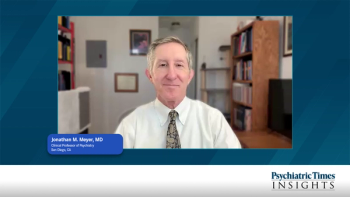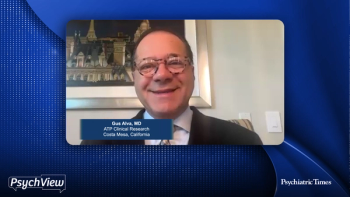
Discussing an Approved Prescription Digital Therapeutic
Panelists discuss the integration of Rejoyn, a smartphone app combining cognitive behavioral therapy with Emotional Faces Memory Tasks, highlighting its efficacy in reducing depressive and anxiety symptoms. They also emphasize the ethical importance of informing patients about prescription digital therapeutics (PDTs) as accessible, adverse-effect–free adjuncts that enhance patient engagement and broaden mental health treatment options.
Episodes in this series

Rejoyn, a smartphone app approved last year for major depressive disorder, incorporates cognitive behavioral therapy alongside a unique Emotional Faces Memory Task designed to improve cognitive and emotional processing. Over a 6-week course, patients complete increasingly challenging exercises paired with psychotherapeutic activities and supportive text messages. Clinical study data showed that Rejoyn significantly reduced depressive symptoms, as measured by the Montgomery-Asberg Depression Rating Scale, and also helped alleviate generalized anxiety, particularly in patients with more severe symptoms. This dual impact highlights the app’s potential as a valuable adjunct treatment for mood and anxiety disorders.
Clinicians emphasize the ethical responsibility to inform patients about all available treatment options, which now include PDTs alongside medications and traditional therapy. For some patients, barriers such as anxiety or past negative experiences with psychotherapy make in-person treatment challenging, so PDTs offer an accessible alternative. By educating patients about PDTs, providers empower them to make informed decisions about their care and choose interventions that best fit their preferences and lifestyles. This approach helps bridge gaps in psychiatric care and expands the toolbox for managing mental health conditions.
Beyond symptom management, PDTs can support practical aspects of daily living, such as organization, goal setting, and sustained engagement in treatment. Because these apps have minimal to no adverse effects, clinicians see them as a beneficial addition to traditional treatments. Offering multiple supportive resources aligns with a mindset of abundance, providing patients with as many helpful tools as possible to promote recovery. Encouraging patients to become active stakeholders in their care strengthens the therapeutic alliance and improves long-term outcomes, making PDTs a promising avenue in modern mental health treatment.
Newsletter
Receive trusted psychiatric news, expert analysis, and clinical insights — subscribe today to support your practice and your patients.




